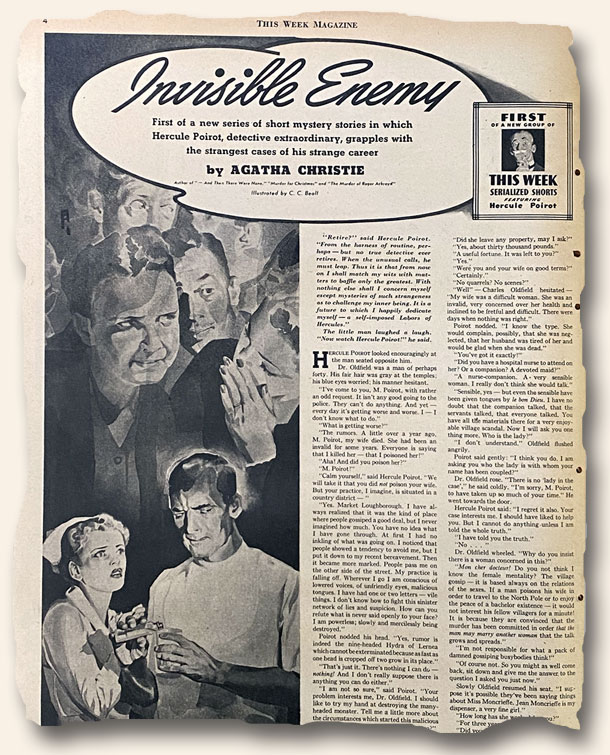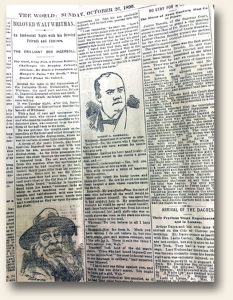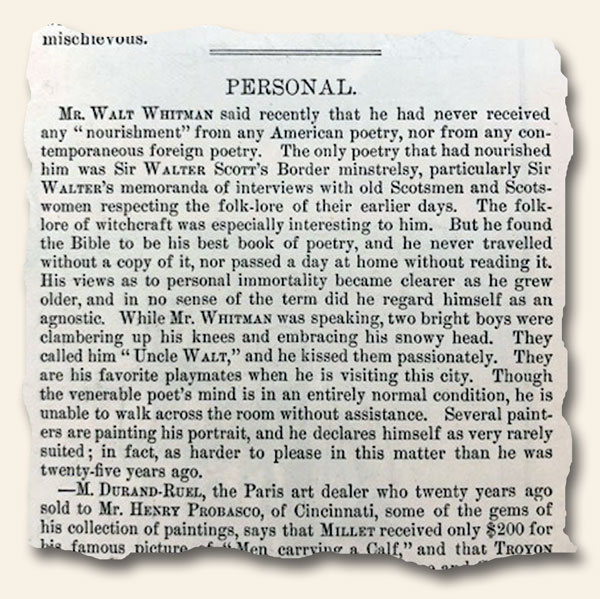Master Wordsmiths Often 1st Shared Their Treasures in Newspapers…
April 12, 2021 by LauraH · Leave a Comment
What do Walt Whitman (poet extraordinaire) … Joel Chandler Harris (Uncle Remus fame) … Charles Dickens (needs no introduction) all have in common? Perhaps my title gave the answer away. These and many other authors often shared their literary master pieces in newspapers before they were printed in book form. Recently, as I was delving into some San Francisco Chronicles, I came upon another addition to this illustrious list. Warm welcomes to Dame Agatha Mary Clarissa Christie, Lady Mallowan. On September 3, 1939, the San Francisco Chronicle, This Week Magazine section began a “thrilling series of short mystery stories” by Agatha Christie. This 1st story in the series “The Labours of Hercules” was titled “Invisible Enemy”. By putting such variety of writing into a public newspaper, the everyday person was often exposed to quality literature giving them the opportunity to increase their education in a casual way. Thanks to these master story tellers for sharing with all of us.
Lincoln & Whitman … it’s all in the perspective…
March 8, 2021 by LauraH · Leave a Comment
“It was the best of times; it was the worst of times”… The concept of polar opposites has always been fascinating to me and as I perused issues we have dated March 8 across the decades, the following two contrasting events caught my eye:
 On March 8, 1865, Abraham Lincoln gave his 2nd Inaugural address. The country had spent the last several years in despair as brother killed brother, parents grieved and wives desperately tried to determine how they would survive without their husbands. The Civil War was the darkest period in our young countries history, arguably, even to this day. President Lincoln bore this heavy mantle with grace and dignity when it may have killed a man of lesser conviction.
On March 8, 1865, Abraham Lincoln gave his 2nd Inaugural address. The country had spent the last several years in despair as brother killed brother, parents grieved and wives desperately tried to determine how they would survive without their husbands. The Civil War was the darkest period in our young countries history, arguably, even to this day. President Lincoln bore this heavy mantle with grace and dignity when it may have killed a man of lesser conviction.
Simultaneously, Walt Whitman was taking the epic that was the American Story and transforming even it’s dark and ugly pieces into a more palatable and poetic form.
On March 8, 1888 the New York Herald printed another of Whitman’s works titled, My Canary Bird. Publishing his works in the newspaper put Whitman’s perspective of America in the hands of the common man which is exactly where he would have wanted it. Beauty from Ashes, the American Story had a devotee in Walt Whitman. He had a way of making “The worst of times” into “The best of times”.
I’m New Here: Week Eleven…
April 26, 2019 by Stephanie Williams · 4 Comments
Now that I have been here for a couple of months, the fuzziness is clearing a little bit more. Even better, to my way of thinking, is a growing familiarity with names and voices of some long-time collectors. It’s a cheery thing to have someone greet you by name with an optimistic lilt to their new request. At least, it is a very cheerful thing to me and I have a growing collection for whom I feel a certain ownership.  It helps the general air of camaraderie that I am getting it right at least as often as I get it wrong these days.
It helps the general air of camaraderie that I am getting it right at least as often as I get it wrong these days.
One of the customers I am silently referring to as “mine” has a list of dates and titles, and he doles them out to me at a rate of about three or four a week. He fits that category the crew here refers to as “research request”, and I am always happy when he calls or emails. Like some collectors, this gentleman is pursuing a theme, and his quests for pertinent people or events can span more than two hundred years. There are sections of our archives that I now find quickly, and those titles are easily located and verified for desired content (by people much more proficient than I). Occasionally, there is a request that leads me to a part of the archives I would swear was not there the last time I searched that quadrant.
This week an assignment took me up to the ninth row of aisle WC. After pulling out the very bottom volume (these are anywhere from ten to fifteen pounds each, and stacked four or five high) I swooshed down to find a table upon which to search the pages for the relevant issue. And that’s where I began to learn brand new things. This volume, all wrapped and sealed as if ready for shipping, surely required a different process than I had used on previous queries. But when asked, both of my sources responded with faint groans and some muttered utterances that still perplex me. The upshot was that it is all the fault of some fellow who wanted to increase the profit margin on newspapers and led the industrial trend to switch from rag paper to newsprint made exclusively of wood pulp. Consequently, a newspaper from 1600’s or 1700’s is able to be folded and rolled and thoroughly read — while a New York Times from June of 1900 can crumble just from attempting to lift a page.
A name was uttered — and I would repeat it if I knew I had the facts just right. But I don’t even understand clearly what makes the paper so bad. It has something to do with acidic materials used to create the wood pulp that damaged the integrity of the pages over a period of time…
It takes me back to Walt Whitman, with apologies for the repetition. His chatty interview with Robert Ingersoll was published in the pulpish time of The World (NY) dated October, 26, 1890. The content is rich with dialogue and illustrations, but there aren’t many copies that survived, due to their fragility. Thankfully, the publishing houses learned from their mistakes and by the 1930’s changes were made.
Anyway, I am pleased to be making your acquaintance, and now know how to treat future pulpish requests, should they arrive.
I’m New Here, Weeks Five & Six…
March 22, 2019 by Stephanie Williams · Leave a Comment
It’s a great day when you locate an issue that someone is wanting, particularly when they really want it. Usually the request begins with, “There’s probably no chance you have this title, but…” Because of our significant database I can now ascertain the general direction a new search will go, and have learned to further diminish expectations with words like, “Well, you are correct — that is a highly desirable date…” Occasionally, my computer will display little notes or other indicators that this is possibly something I (with assistance) can find. Without raising hopes I mention that it doesn’t look promising but there is something I want to double-check before I give a definitive “no”.
 This morning’s call from one of our cheery customers delivered a query for a Harper’s Weekly from 1863. He was looking for Emancipation Proclamation content, although many collectors want that particular issue for the full page Winslow Homer print or the double-page Thomas Nast “The War in the Border States”. I reverently turned the pages to investigate the text in question, and found it free of foxing or damp stains or tears. And then I found something else.
This morning’s call from one of our cheery customers delivered a query for a Harper’s Weekly from 1863. He was looking for Emancipation Proclamation content, although many collectors want that particular issue for the full page Winslow Homer print or the double-page Thomas Nast “The War in the Border States”. I reverently turned the pages to investigate the text in question, and found it free of foxing or damp stains or tears. And then I found something else.
Just beside the historical, monumental words, the Harper’s editor placed or approved a first installment of Wilkie Collins’ No Name. Although I have read his fifth book, I didn’t know that Collins was another contemporary of Dickens and Whitman. I didn’t even know that “Wilkie” was a man. And these little rabbit trails clamored for my attention and had me skimming the assertion by William Makepeace Thackeray on The Woman in White: that it had him “transfixed” – a book that I’d found lengthy and melodramatic upon personal encounter.
I particularly enjoy this multi-layered discovery aspect of collecting/perusing early newspapers, and I grin over the notes back from purchasers describing the bonus treasures. One that came this week included an exclamation over a Gentleman’s Magazine: “R is over the moon as we discovered a paragraph about an intercepted letter from Alexander Hamilton complaining about congress and money! It’s just stunning to read these things as contemporary accounts.”
So, feel free to join the conversation and comment about the amazing things you unexpectedly have in your collection that you never intended to purchase. My own W.C. search is ongoing, as all the commentary I can find is that Collins was serialized in Dicken’s “All The Year Round”, with nary a mention of the great Harper’s. Incidentally, if you are new to this world it might either interest or frustrate you to know the brand encompasses “Harper’s Weekly”,” Harper’s Monthly” (which is also sometimes called “Harper’s New Monthly”), and then the non-newspaper titles of “Harper’s Bazaar” and the various Harper’s books. The Timothy Hughes Rare & Early Newspaper inventory contains the first two titles and it is there I will be searching for Chapter Two.
At least, that is how it will begin.
I’m New Here…Week Three
March 1, 2019 by Stephanie Williams · 2 Comments
 These last few days have been highlighted by fascinating rare newspaper excursions that touched on Johnny Appleseed and hot air balloons and genealogy searches and gold ink newspaper editions and even “mourning rules” (a post-worthy ramble in itself). As this week closes, I find myself musing on all things literary.
These last few days have been highlighted by fascinating rare newspaper excursions that touched on Johnny Appleseed and hot air balloons and genealogy searches and gold ink newspaper editions and even “mourning rules” (a post-worthy ramble in itself). As this week closes, I find myself musing on all things literary.
I recall my first encounter with Walt Whitman’s poetry as being somewhat controversial. Compiling an anthology for a sixth grade project I stumbled across “Song of Myself” and laboriously copied it out onto its own page — carefully fitting text to margins and indents that defined, despite lackluster rhyme or rhythm scheme. Abruptly, I was the focus of adults pontificating on the perils of the modern age and the coming doom symbolized by artists throwing off established norms and strictures. In college, I was perplexed to find that Whitman wrote his grieving “Lilacs” four months after the eloquently detailed sixteen hundred mile funeral procession for Abraham Lincoln. From all the squawking, I had assumed the poet lived in my time, or my parents’ time — not contemporaneously with the sixteenth president. I’m keen on Frost and Dickinson and Oliver and all the greats, but Whitman broke the lingering nursery rhyme cadence of Robert Louis Stevenson with a clear voice of plain-speaking, beauty filled, heartwrenching truth. And so, with ten minutes of unscheduled time this week, I delved into the directories of perhaps the largest Civil War newspaper collection in the world, to see what we might have within our archives. Three years after Lincoln’s assassination, the popular New York Herald was the first to publish the words “…to all cut off before their time, Possess’d by some great spirit of fire Quenched by an early death.” It is signed in block type, “WALT WHITMAN”. And, yesterday, I held it in my very own 21st century hands, looking at this poem irreverently sandwiched between complaints against Kansas senators and the connection of the Minneapolis/Montreal railroad. In 1888 Walt Whitman’s words were taken at face value, distinct from any of the acclamation or aspersion that would come with the passage of time. Reading them, this way, is a little bit like traveling back two hundred years to look at things from a completely different view. Many of you who call or email or write or browse online in search of particular subjects, dates and people are reaching for the insight from the immediate context of newsprint columns, to hear what was once merely words in print, chronicling the events of the day.
At any rate, no one can live by poetry alone, so next Friday I am honor bound to tell you of one or two colossal mistakes I have made, and balance this week’s ponderous tone with a humorous tale or two. Things around here are often funny and deep — a little bit like those old, modern poets.
They put it in print – Walt Whitman did not appreciate contemporary poetry…
October 18, 2018 by GuyHeilenman · Leave a Comment
During an interview in 1887, Walt Whitman stated he did not appreciate contemporary poetry, with one exception. How do we know? They put it in print in the Harper’s Weekly dated April 23, 1887:
A curious find that lead to more than expected…
July 25, 2016 by TimHughes · Leave a Comment
Although not a poetry aficionado, I am aware that “Leaves Of Grass” by Walt Whitman is considered a seminal work in 19th century literature. So when I stumbled across a small article on page 7 of a New York Tribune issue dated Oct. 10, 1855 I took a moment to read it. Most of the report is taken up with a letter signed in type: R. W. Emerson, so my interest was piqued.
After a number of Google searches I discovered this report to be much more significant that I might have thought.
Although considered highly controversial during his era, “Leaves of Grass” has infiltrated popular culture & been recognized as one of the central works of American poetry. As such, the article is interesting, mentioning in part: “…call the attention of our readers to this original & striking collection of poems, by Mr. Whitman…could not avoid noticing certain faults which seemed to us to be prominent in the work. The following opinion, from a distinguished source, views the matter from a more positive and less critical stand-point:…” and what follows is the famous letter by Ralph Waldo Emerson–who inspired this work by Whitman–in which he comments: “…I find it the most extraordinary piece of wit and wisdom America has yet contributed…I am very happy in reading it, as great power makes us happy…” and even more, signed in type: R. W. Emerson. This original letter is in the Library of Congress.
This letter’s appearance in the Tribune would seem to be the only newspaper printing of the time, as records indicate that the: “…letter to Whitman from Ralph Waldo Emerson, 21 July, 1855 is among the most famous letters ever written to an aspiring writer…Without asking Emerson’s permission, Whitman gave this private letter to Charles Dana [managing editor of the New York Tribune] for publication in the New York Tribune on October, 1855.” (see this hyperlink).




